The Fabliau
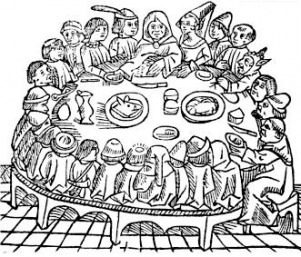
A Medieval (Low Table) Feast
To write The Squire's Second Tale I had to overcome some inhibitions, for since I had a fabliau in mind, it would require both fruity language and bawdy action.
One read of Chaucer's Miller's Tale put my mind at rest, though. If the Father of English Poetry could use 'arse', 'fart' and 'piss', why couldn't I incorporate similar language. Thus, in The Squire's Second Tale, the evil maid-in-waiting, Jane, having been tricked into drinking a laxative, rushes to her lover, the Apothecary's bedchambers, where:
Arriving at the ’pothecary’s door
She rapped and cried, and in distress did roar
And beg her paramour, “At once admit
Your dearest Jane, for I’m besmirched with shit.”
One read of Chaucer's Miller's Tale put my mind at rest, though. If the Father of English Poetry could use 'arse', 'fart' and 'piss', why couldn't I incorporate similar language. Thus, in The Squire's Second Tale, the evil maid-in-waiting, Jane, having been tricked into drinking a laxative, rushes to her lover, the Apothecary's bedchambers, where:
Arriving at the ’pothecary’s door
She rapped and cried, and in distress did roar
And beg her paramour, “At once admit
Your dearest Jane, for I’m besmirched with shit.”
The Fable
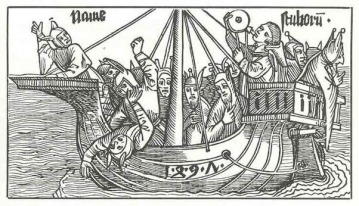
The Ship of Fools
Next came The Shipman's Second Tale, a story about the 'fabled Babel Fish' which has the power of speech. When Adam, a poverty-stricken fisherman, captures the fish, he promises:
“I’ll harm you not, oh strange aquatic beast,
Nor let my wife transform you to a feast.
To me you are more valuable alive,
And with your precious help once more I’ll thrive.
For talking fish are rare and folk will pay
To hear the words of wisdom that you say.”
“I’ll harm you not, oh strange aquatic beast,
Nor let my wife transform you to a feast.
To me you are more valuable alive,
And with your precious help once more I’ll thrive.
For talking fish are rare and folk will pay
To hear the words of wisdom that you say.”
Medieval Chick Lit
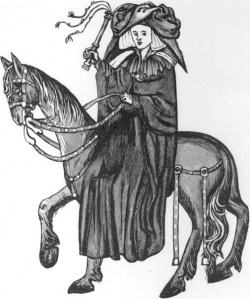
The Wife of Bath
Tackling the Wife of Bath and a tale of female empowerment in medieval society was a challenge, for by Including such an eponymous character in the prologue and epilogue to The Wife of Bath's Second Tale took a great deal of research and reading. The story itself is about a thatcher's daughter, Gwendolyn, who battles against the odds to better herself through education and by learning the courtly knowledge of being a lady. Below is the Wife of Bath introducing her second tale, her introduction coming after a bout of lively banter between herself, the Shipman and the Host over the merits of marriage:
And knowing this, the cheeky Wife of Bath,
Who sat ensconced beside the tavern hearth
With one hand cupped against her hearing ear,
Quod, “Captain, sir, of women have no fear.
I note retirement from the sea doth loom
By your advancèd looks. And if no broom
Is nestling in your home to sweep and clean,
Then find yourself a spouse – one not too lean,
And knowing this, the cheeky Wife of Bath,
Who sat ensconced beside the tavern hearth
With one hand cupped against her hearing ear,
Quod, “Captain, sir, of women have no fear.
I note retirement from the sea doth loom
By your advancèd looks. And if no broom
Is nestling in your home to sweep and clean,
Then find yourself a spouse – one not too lean,
|
But meaty and well versed in worldly tricks.”
“By God,” the Host cried, “you’ll be number six My Shipman friend, which might be for your good – But only if your head is made of wood.” The Wife roared out with laughter. “That’s well said,” Quod she, then extricated from her head That monstrous hat and turned her gap-toothed smile Upon her fellow pilgrims. “’Tis by guile And learning,” she informed them, “that today A woman born of humble parents may Escape the chains of lowly birth, and wed Above her station ere that she be dead From poverty, or hunger, or disease. |
But frequently that dream of moneyed ease
Remains just that – an unattainèd dream. Yet always in a woman’s heart the gleam Of hope persists that if enough she strived, Unto a better man she could be wived. So if it please you all I’ll tell a tale Of one young maiden skewered on the nail Of penury, who hoped to realise Her dream of scooping up a spousal prize Beyond convention’s narrow-minded scope, While those around her tried to thwart that hope.” The pilgrims nodded, and at once agreed That Alison of Bath should now succeed The Shipman with a story to enthrall The captivated gath’ring, one and all. |
Crime Time
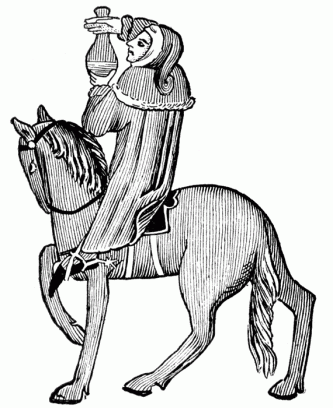
The Doctor of Physic
Returning to my roots as a crime writer, I chose the Doctor of Physic to tell the story of Friar Ted, a crime-busting mendicant. Famed for his skills of detection, when he finds a stranger dead on a lonely road, he invokes his special talents to uncover the culprit. In the excerpt from The Doctor Of Physic's Second Tale below, Friar Ted examines the body of the dead man, searching for clues as to where he is from and why he was killed:
Then Friar Ted drew near to scrutinise
The dead man’s clothing with his searching eyes
And noticed that the turquoise cloak he wore,
(Although bespattered here and there with gore)
Was of the finest continental weave.
“’Tis Flemish by its texture, I believe,”
The Friar Quod. “Most richly is it dyed.
Indeed, this traveller took the utmost pride
In how he dressed, since also, on his feet,
Are fur-lined boots designed to keep the heat
From leaking out into the frosty air.
Which begs the question if a man should wear
Then Friar Ted drew near to scrutinise
The dead man’s clothing with his searching eyes
And noticed that the turquoise cloak he wore,
(Although bespattered here and there with gore)
Was of the finest continental weave.
“’Tis Flemish by its texture, I believe,”
The Friar Quod. “Most richly is it dyed.
Indeed, this traveller took the utmost pride
In how he dressed, since also, on his feet,
Are fur-lined boots designed to keep the heat
From leaking out into the frosty air.
Which begs the question if a man should wear
|
Such plush apparel and appear so rich,
How did he end up dead beside a ditch |
In this remote, unpopulated place?
By God, this is a most perplexing case.” |
Chivalry and Cowardice
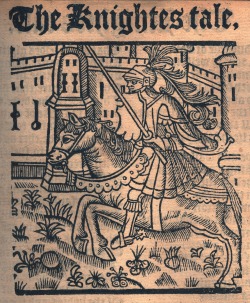
The Knight
For my next Canterbury Tale, The Knight's Second Tale, I created the caddish Sir Goldenlocks, an Arthurian wannabe knight, ladies' man and dragon slayer.
Goldenlocks rises through the ranks - from Page, to Squire, to Knight - due to the untimely demise of his two previous masters. Their deaths are caused largley by Goldenlocks's cowardice, negligence and machinations whilst in the field dragon-hunting. However, since no one sees his cowardice, his heroic account of events is all that those at Camelot get to hear.
For me this was a landmark Canterbury Tale on two counts. It was the first for which I initially wrote an abridged version (this is now a standard practice), and it was the first 'new' Tale to reach a large audience. In May last year, tentatively titled 'The Miller's Second Tale', the abridged story of Sir Goldenlocks was published on the Everyday Poets website.
http://www.everydaypoets.com/the-millers-second-tale-by-paul-a-freeman/
The Knight's Second Tale also received a high commendation from Writers' Forum magazine on its poetry competition page.
In this excerpt from The Knight's Second Tale, Goldenlocks explains to Sir Tamarind (a Mongol mercenary, and his second master) how his first master, Sir Troy of Walthamstow, was killed by dragons:
Goldenlocks rises through the ranks - from Page, to Squire, to Knight - due to the untimely demise of his two previous masters. Their deaths are caused largley by Goldenlocks's cowardice, negligence and machinations whilst in the field dragon-hunting. However, since no one sees his cowardice, his heroic account of events is all that those at Camelot get to hear.
For me this was a landmark Canterbury Tale on two counts. It was the first for which I initially wrote an abridged version (this is now a standard practice), and it was the first 'new' Tale to reach a large audience. In May last year, tentatively titled 'The Miller's Second Tale', the abridged story of Sir Goldenlocks was published on the Everyday Poets website.
http://www.everydaypoets.com/the-millers-second-tale-by-paul-a-freeman/
The Knight's Second Tale also received a high commendation from Writers' Forum magazine on its poetry competition page.
In this excerpt from The Knight's Second Tale, Goldenlocks explains to Sir Tamarind (a Mongol mercenary, and his second master) how his first master, Sir Troy of Walthamstow, was killed by dragons:
|
Into the castle hall the boy was shown
A fragile youth - no more than skin and bone – Whose rosy cheeks were streaked with running tears. Yet ’neath his frame the lad was wise in years Beyond his seventeen. For once he saw His master, Troy, had failed to win at war ’Gainst sundry dragons, Goldenlocks turned tail. With trembling lip and face a ghastly pale, Upon his horse the battlefield he fled. Troy’s sad demise was on the young lad’s head, For Goldenlocks was keeping safe a hoard Of sharpened lances, plus his master’s sword. Outnumbered and equipped with but a spear, The knight beseeched his squire, “Douse your fear And bring my weapons ere the deadly breath Of these foul creatures does poor Troy to death!” Yet Goldenlocks ignored this piteous plea And chose instead - at breakneck speed - to flee. The erstwhile squire of brave Sir Troy now spoke, And since his youthful voice had barely broke, Inside his throat the words appeared to catch. “Courageously my master met his match,” |
Quod he. “And at that this dangerous point I rode
Unto him with his sword and lances stowed Upon my horse in hopes he might rearm And by my selfless act be saved from harm. But Fate had other thoughts, and though I tried To fight the dragons off, my master died. The serpents seized him firmly with their claws And tore off joints of meat with chomping jaws. Exhaling flame, his flesh the beasts did cook; Oh, how I wish to bring them all to book.” His speech complete, the boy began to bawl, Eliciting from those inside the hall Much tearfulness. Quod Arthur, “Goldenlocks Evaded death by fleeing like a fox Pursued by hounds and hid beneath some trees. Although above him, gliding on the breeze, A score of dragons circled overhead, (And from a dozen wounds he freely bled) The boy escaped their all-consuming fire And thus became our sole-surviving squire Returning from a dragon-slaying quest So, Tamarind, pray put your mind at rest - Upon your journey none’s a better aide At keeping safe your lances and your blade.” |
